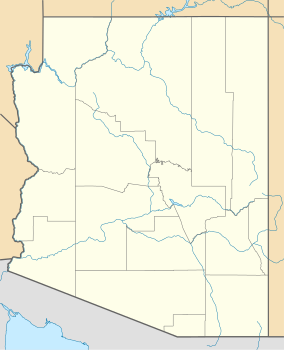Oracle State Park
| Oracle State Park | |
|---|---|
 Location of Oracle State Park in Arizona | |
| Location | Pinal, Arizona, United States |
| Coordinates | 32°36′28″N 110°43′59″W / 32.60778°N 110.73306°WCoordinates: 32°36′28″N 110°43′59″W / 32.60778°N 110.73306°W |
| Area | 3,948 acres (15.98 km2) |
| Established | 1976 |
| Governing body | Arizona State Parks |
Kannally Ranch | |
 The Kannally Ranch house | |
| Location | Mt. Lemmon Hwy, E of Oracle |
|---|---|
| Nearest city | Oracle, Arizona |
| Coordinates | 32°36′35″N 110°44′1″W / 32.60972°N 110.73361°W |
| Area | Less than one acre |
| Built | 1929 |
| Architectural style | Spanish Colonial Revival |
| NRHP reference No. | 96000307 |
| Added to NRHP | March 28, 1996 |
Oracle State Park is a state park of Arizona, US, preserving 3,948 acres (1,598 ha) in the northeastern foothills of the Santa Catalina Mountains. The park is named after the nearby town of Oracle. Oracle State Park serves as a wildlife refuge, and is open every day from 9am – 5pm.[1] In October 2011 Arizona State Parks agreed to reopen Oracle on a limited basis with a $40,000 budget if the park's Friends group can raise $21,000 in additional funds.[2] The park has more than 15 miles (24 km) of hiking trails, including 7 miles (11 km) of the Arizona Trail.[3]
History[]
For 75 years a ranching family owned the property that now comprises Oracle State Park. The family gave the property to the Defenders of Wildlife organization in 1976,[4] and ten years later, the land was donated to the state of Arizona to create a preserve.[3]
Flora and fauna[]
Plants[]
The most common plants in Oracle State Park are prickly pear and cholla cactus, scrub oak, mesquite, many wildflowers, and the occasional piñon and juniper. A solitary saguaro cactus is located in the park. The original ranch house, which was converted to be the park headquarters, has some cypress trees nearby.
Wildlife[]
Bird species include red-tailed hawks, golden eagles, prairie falcons, black-throated sparrows, Gambel's quail, cactus wrens, pyrrhuloxia, northern mockingbirds, northern flickers, common poorwills, northern cardinals, and great horned owls. Many mammals inhabit the park, such as ringtails, javalinas, cougars, rock squirrels, desert cottontails, black-tailed jackrabbits, mule deer, and white-tailed deer. Reptiles and amphibians found in the area include the western box turtles, Arizona alligator lizards, Colorado River toads, bull snakes, and western diamondback rattlesnakes.[3]
Kannally Ranch House[]
The Kannally Ranch House is a historic house museum with original art and historic photos. The four-level adobe home was constructed between 1929 and 1933, features Mediterranean and Moorish architectural influences and is listed on the National Register of Historic Places.
Center for Environmental Education[]
The purpose of the park is to "protect the designated wildlife refuge and act as an environmental learning center."[1] Before closure the park offered natural history and environmental education programs for school and adult groups, including trail walks, workshops, presentations and special events.
References[]
- ^ a b Arizona State Parks. "Oracle State Park".
- ^ "Oracle State Park could open part-time in February 2012". The Explorer. Tucson, Ariz. 2011-10-05.
- ^ a b c Laine, Don & Barbara (1998). New Mexico & Arizona State Parks: A Complete Recreation Guide. The Mountaineers. pp. 236–237. ISBN 0-89886-559-X.
- ^ Kreutz, Doug (August 13, 2006). "Kannally House at Oracle park a Mediterranean oasis". Arizona Daily Star. Tucson, Arizona.
External links[]
- 1976 establishments in Arizona
- Historic house museums in Arizona
- Museums in Pinal County, Arizona
- Parks in Pinal County, Arizona
- Protected areas established in 1976
- Santa Catalina Mountains
- State parks of Arizona
- Houses on the National Register of Historic Places in Arizona
- National Register of Historic Places in Pinal County, Arizona
